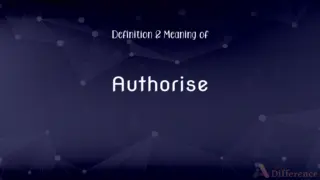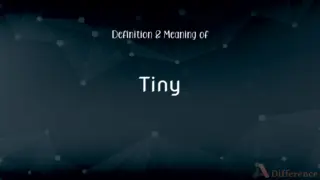Joining Definition and Meaning
By Tayyaba Rehman & Maham Liaqat — Published on April 19, 2024
Joining refers to the act of connecting or combining things together. e.g., The workers were busy joining the two sections of the bridge.
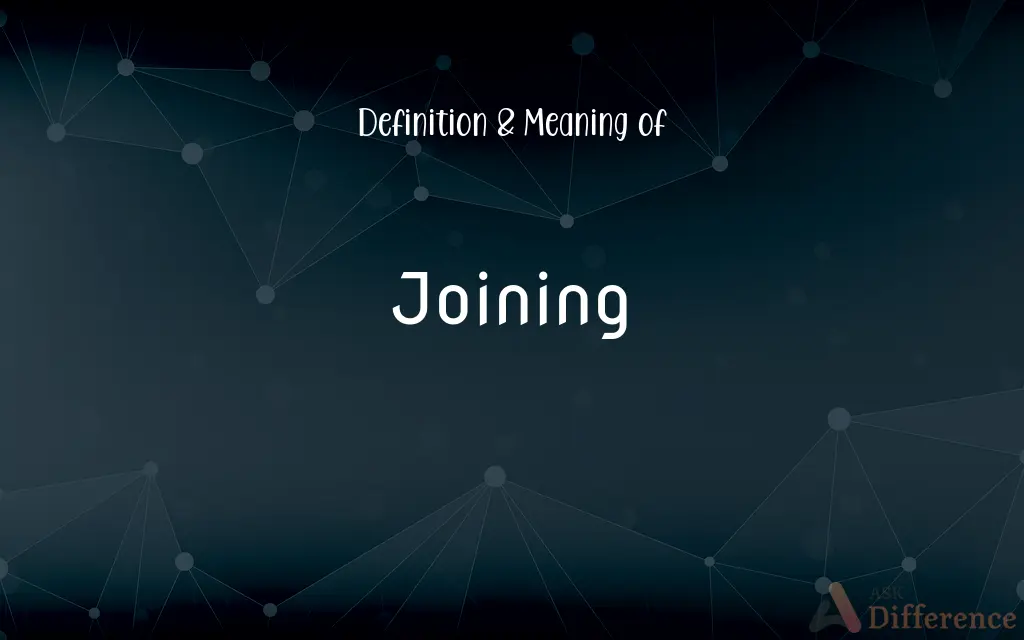
Table of Contents
Joining Definitions
The process of becoming a member of a group.
She celebrated joining the local book club.
Engaging in a partnership or alliance.
The companies are joining forces to tackle environmental issues.
Entering into marriage or a romantic relationship.
They are joining their lives in a ceremony next spring.
The act of meeting or coming together at a point.
The two rivers assist in joining at the delta.
Combining efforts or resources for a common purpose.
Joining their talents, the team developed a successful project.
Merging two ideas into a coherent whole.
Joining his creativity with her technical skill led to an innovative solution.
The act of signing up for a service or activity.
She's considering joining the online course next month.
The physical action of connecting materials, like in woodworking or metalworking.
The carpenter specialized in joining wooden pieces without nails.
To put or bring together so as to make continuous or form a unit
Join two boards with nails.
Joined hands in a circle.
To put or bring into close association or relationship
Two families that were joined by marriage.
Join forces.
To connect (points), as with a straight line.
To meet and merge with
Where the creek joins the river.
To become a part or member of
Joined the photography club.
To come into the company of
Joined the group in the waiting room.
To participate with in an act or activity
The committee joins me in welcoming you.
To adjoin
Where the garage joins the house.
To engage in; enter into
Opposing armies joined battle on the plain.
To come together so as to form a connection
Where the two bones join.
To act together; form an alliance
The two factions joined to oppose the measure.
To become a member of a group.
To take part; participate
Joined in the search.
A joint; a junction.
Present participle of join
The act or result of joining; a joint or juncture.
The act of bringing two things into contact (especially for communication);
The joining of hands around the table
There was a connection via the internet
Connecting two or more pieces together.
Joining wires correctly ensures the circuit works.
Associating or linking with something.
He regretted not joining the discussion earlier.
Joining Snonyms
Linking
To connect or join in a series or chain.
The new railway project will be linking several major cities.
Associating
Joining or connecting together in a relationship.
He is associating with the right people to advance his career.
Consolidating
Joining together into a more solid or coherent structure.
The business is consolidating its operations to improve efficiency.
Uniting
To make or become a single unit.
The crisis had the effect of uniting the community.
Merging
Combining into a single entity.
The two small schools are merging next year.
Connecting
Bringing together or into contact.
The bridge is connecting the two separated islands.
Fusing
To join or blend to form a single entity.
The artist is fusing glass and metal in his new sculpture.
Coupling
Connecting two items together.
The mechanic is coupling the engine to the transmission.
Binding
To tie or secure closely together.
The agreement is binding the two companies into a long-term contract.
Integrating
Combining one thing with another to become a whole.
The program focuses on integrating technology into the classroom.
Joining Example Sentences
Joining a club at school can help you make new friends.
After joining the pieces, the puzzle was finally complete.
They're planning on joining their backyards with a new fence.
She's thinking about joining a gym to get more exercise.
Many young people dream of joining the military.
He enjoyed joining the dots in his coloring book.
They were cautious about joining the alliance without more information.
Joining a study group can improve your grades.
Joining the conversation, she offered some valuable insights.
He's looking forward to joining the family business after college.
She found joining the local theater group very fulfilling.
They're joining their efforts to fundraise for the charity.
Joining the competition gave him a new sense of purpose.
Before joining the company, she did thorough research.
After joining the online community, she felt less isolated.
Common Curiosities
How is joining used in a sentence?
Joining is often used to describe the act of connecting or becoming part of a group, e.g., He considered joining the chess club.
How many syllables are in joining?
There are two syllables in joining.
What is a stressed syllable in joining?
The first syllable is stressed in joining.
Why is it called joining?
It's called joining because it involves connecting or combining things together.
What is the third form of joining?
The third form is also "joined."
How do we divide joining into syllables?
Joining is divided into syllables as join-ing.
What is the pronunciation of joining?
Joining is pronounced as /ˈdʒɔɪnɪŋ/.
What is the second form of joining?
The second form is "joined."
What is the singular form of joining?
The singular and base form is "join."
What is the first form of joining?
The first form is "join."
What is the root word of joining?
The root word is "join."
Is joining an adverb?
No, joining is not used as an adverb.
What is the verb form of joining?
The verb form is "join."
Is joining an abstract noun?
Yes, joining can be considered an abstract noun as it refers to the concept or process of connecting or becoming part of something.
Is the word “joining” a Direct object or an Indirect object?
In sentences, "joining" can be the direct object of a verb, but it is not used as an indirect object.
Is joining a noun or adjective?
Joining is primarily used as a noun in the context of the act or process, but it can also function as a verb.
Is joining a vowel or consonant?
The word joining starts with a consonant.
Is joining a countable noun?
No, joining in its nominal form is not typically counted and therefore is not a countable noun.
Is the word joining imperative?
The base form "join" can be used as an imperative verb.
Which determiner is used with joining?
Determiners like "the" or possessive pronouns can be used with joining, depending on the context.
What part of speech is joining?
Joining is a noun when referring to the act or process, and a verb when referring to the action.
What is the plural form of joining?
Joining does not have a plural form; however, joins can be a plural form when referring to multiple instances or types of connections.
Is joining a negative or positive word?
Joining is generally a neutral word, though it can have positive connotations in the context of unity or partnership.
Is the joining term a metaphor?
The term joining can be used metaphorically to describe the process of coming together or uniting in abstract contexts.
What is the opposite of joining?
The opposite of joining is "separating."
Is joining a collective noun?
Joining is not a collective noun; it refers to the act or process rather than a collection of individuals or items.
Which vowel is used before joining?
The vowel "i" is used in the second syllable of joining.
Which conjunction is used with joining?
Conjunctions are not specifically used with joining but can connect clauses where joining is discussed.
What is another term for joining?
Another term for joining is "uniting."
Is the word joining Gerund?
Yes, joining functions as a gerund when used as a noun.
Which preposition is used with joining?
Prepositions such as "in," "to," and "with" can be used with joining, depending on the context.
Which article is used with joining?
The definite article "the" or the indefinite articles "a/an" can be used with joining, depending on the context.
Share Your Discovery
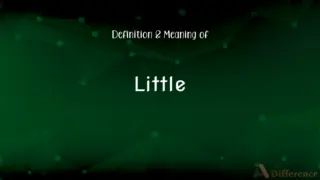
Previous Term
Little Definition and Meaning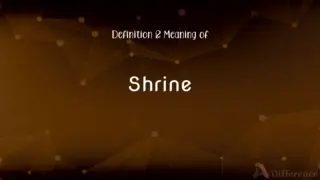
Next Term
Shrine Definition and MeaningAuthor Spotlight
Written by
Tayyaba RehmanTayyaba Rehman is a distinguished writer, currently serving as a primary contributor to askdifference.com. As a researcher in semantics and etymology, Tayyaba's passion for the complexity of languages and their distinctions has found a perfect home on the platform. Tayyaba delves into the intricacies of language, distinguishing between commonly confused words and phrases, thereby providing clarity for readers worldwide.
Co-written by
Maham Liaqat






